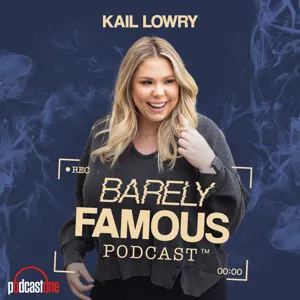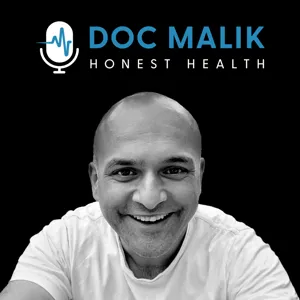Podcast Summary
Navigating healthcare with advocacy: Being informed and assertive during healthcare experiences can lead to better care. Patients and loved ones should advocate for themselves in the intimidating healthcare system.
Patient advocacy is crucial when navigating the healthcare system, especially during overwhelming and intense experiences. Host Chris Duffy shares his personal experience helping his wife deal with chronic health issues and the conflicting advice they received from doctors. Dr. Lena Nguyen, a physician and patient advocacy leader, emphasizes the importance of self-advocacy for patients and their loved ones. The healthcare system can be intimidating, but being informed and assertive can lead to better care. Pervasive issues in the healthcare system, including the pandemic, highlight the importance of being proactive and advocating for oneself.
The healthcare system fails to recognize humanity: Doctors and patients need empathetic communication to improve healthcare outcomes and relationships
The healthcare system can often fail to recognize the humanity of both doctors and patients, leading to misunderstandings, misdiagnoses, and a lack of trust. Doctors, due to time constraints and a focus on testing, may reduce patients to their symptoms, while patients may view doctors as infallible machines. This disconnect can have life-threatening consequences. The root cause is the lack of time doctors have with patients, leaving them unable to fully understand the context of their patients' lives and conditions. To improve this situation, individuals can advocate for themselves and prioritize open communication with their healthcare providers. Encouraging a more empathetic and human-centered approach in healthcare can lead to better outcomes and stronger patient-provider relationships.
Preparing for medical situations: Being prepared with medical info can improve care in emergencies and routine appointments. Keep a list of conditions, meds, allergies, contacts for effective care.
Being prepared for medical situations, whether routine or emergency, can significantly improve the quality of care received. For emergencies, having a list of medical conditions, medications, allergies, doctors' contact information, and emergency contacts readily available can help reduce confusion and ensure accurate and effective care. For non-emergency situations, preparing a clear and concise history of symptoms and reasons for seeking medical attention can help doctors make more accurate diagnoses and provide better care. It's important to remember that while emergencies are unpredictable, taking steps to be prepared can make a big difference. And for routine appointments, being well-informed and clear about your symptoms and medical history can lead to better outcomes as well.
Prepare a clear health story for doctor's visit: Writing down health context, history, and symptoms improves doctor visits by providing valuable context, helping communicate effectively, and avoiding forgetting important details.
Preparing a clear and concise story about your health concerns before visiting a doctor can significantly improve your experience and help ensure that important information is not missed. By writing down the context, history, and current symptoms of your condition, you can provide doctors with valuable context and help them understand the urgency and severity of your situation. This approach also allows you to communicate effectively, even if you're feeling well during the appointment. Additionally, preparing a story can help you avoid common pitfalls, such as forgetting important details or appearing nonchalant about your symptoms. So, take the time to write down your health story, rehearse it, and bring it with you to your next doctor's appointment. This simple step can make a big difference in the quality of care you receive.
Take charge of your health conversations: Prepare questions, understand symptoms, and clearly communicate concerns to ensure effective doctor visits
When facing a health issue and feeling like your doctor isn't fully listening, it's crucial for you to take an active role in the conversation. You are the expert on your own story and body, so prepare by writing down your questions and understanding your symptoms and their impact on your life. Be clear and concise when explaining your concerns to your doctor, emphasizing any changes or worsening symptoms that may require more attention. Remember, your doctor is likely well-intentioned but may be dealing with other urgent cases or misunderstanding your concerns. By advocating for yourself and effectively communicating your situation, you can help ensure that your doctor fully understands and addresses your health concerns.
Expressing concerns and bringing an advocate to appointments: Patients who feel unheard or misunderstood should express their concerns and consider bringing a trusted advocate to appointments to help ensure their voice is heard and the focus stays on finding a solution.
If you're a patient who has tried various treatments and still feel unheard or misunderstood by your doctor, it's important to express your concerns and belief that there may be something else going on. Encourage your doctor to consider what they believe the issue could be, and consider bringing a trusted advocate, such as a family member or friend, to appointments to help ensure your voice is heard. Your advocate can provide additional perspective and help keep the focus on finding a solution. Remember, your doctor is working to rule out potential diagnoses, but it's important to keep the conversation focused on what the most likely issue may be. By working together and advocating for yourself, you can help ensure that you receive the best possible care.
Advocating for Your Health: The Importance of Support and Self-Awareness: Having support from loved ones or doctors can help overcome barriers in healthcare. Being aware of personal health issues and utilizing the right tools can significantly improve quality of life.
Having support from others, whether it's a loved one or a doctor, can make a significant difference in advocating for your health needs. Privilege and implicit biases can create barriers in the healthcare system, and having someone vouch for you can help ensure that your concerns are taken seriously. It's important to utilize all available resources to advocate for yourself and prioritize your health. Additionally, being aware of and addressing personal health issues, such as allergies, can greatly improve quality of life. Claritin D, with its powerful allergy relief and decongestant properties, can help those suffering from allergies live more easily and breathe freely. And, as a runner myself, I can personally attest to the importance of having the right tools for the job, like Brooks Running shoes, which provide the perfect balance of lightweight design and soft cushioning for a comfortable and effective running experience.
Advocating for Health Equity: Personal and Systemic Change: Use personal stories to compel action, get involved at various levels, from local hospitals to state and federal policies, and take small actions within healthcare systems to contribute to the larger goal of health equity.
Each of us has the power to advocate for health equity, both personally and systemically. Dr. Wen's experiences in the ER and growing up in poverty fueled her passion for making healthcare more equitable. She emphasizes the importance of using personal stories to compel action and encourages individuals to get involved at various levels, from local hospitals to state and federal policies. For healthcare professionals, she suggests starting with small actions within their own healthcare systems, joining patient and family representative committees, and advocating for change at every opportunity. Ultimately, she encourages everyone to take action, no matter how small, to contribute to the larger goal of making healthcare a more equitable place for all.
Connecting with patients for accurate diagnoses: During telemedicine visits, the absence of distractions allows for deeper patient-doctor connection and active listening, leading to more accurate diagnoses.
Physicians should prioritize connection and active listening with their patients, whether in person or remotely, to build trust and make accurate diagnoses. During in-person visits, other sensory inputs can distract from fully focusing on the patient's story. However, during telemedicine visits, the absence of these distractions can provide an even greater opportunity for patients to convey their stories and for doctors to listen intently. Building trust with a medical practitioner is essential, and can be achieved through word-of-mouth referrals or getting to know them before an urgent issue arises. Ultimately, returning to the reason why we went into medicine in the first place - to heal and connect with patients - can lead to more effective and compassionate care.
From personal experiences to making healthcare a right: Dr. Lena Nguyen's passion for healthcare stems from her personal experiences and a desire to make it a right for all, prioritizing her own well-being and that of her family while committing to creating a better world.
Dr. Lena Nguyen's passion for becoming a doctor stems from her personal experiences of receiving medical care as a child with asthma and witnessing the lack of access to healthcare for many people. She aims to make healthcare a right for all, regardless of their circumstances. As a mother, she also prioritizes being present for her children and focusing on her own physical and mental well-being. Dr. Nguyen's dedication to improving the lives of others and herself reflects her commitment to being a better human. She encourages being attentive to mental and physical well-being and emphasizes the importance of creating a better world for future generations.
Become a Better Human with Odoo and Slack: Use Odoo for comprehensive business applications and Slack for effective collaboration to save time, reduce costs, and focus on growing your business
To become a more effective and efficient individual, particularly in a business context, you can benefit significantly from utilizing the tools offered by Odoo and Slack. Odoo is an all-in-one management software that provides a comprehensive library of fully integrated business applications. By switching to Odoo, you can save time and money, streamline your business operations, and gain access to a wide range of features that can help you get more done in less time. Odoo is also more affordable compared to other business software solutions. To learn more about how Odoo can help you be a better human, visit odoo.com/betterhuman. On the other hand, Slack is a collaboration hub where work happens in one place. It integrates all your people, data, and information, allowing you to communicate effectively, start calls instantly, and build automations to take routine tasks off your plate. Slack is particularly useful for growing businesses as it helps you save time and focus on what matters most. To get started with Slack, visit slack.com. In summary, Odoo and Slack are powerful tools that can help you become a better human by making your business operations more efficient and effective. By leveraging the features of these tools, you can save time, reduce costs, and focus on growing your business.





